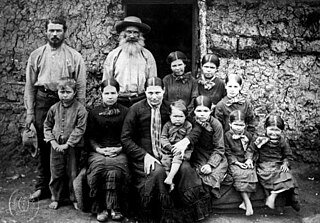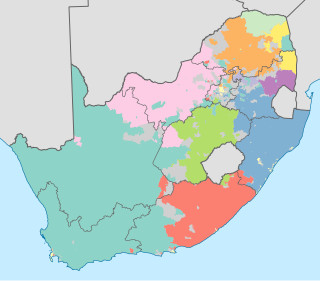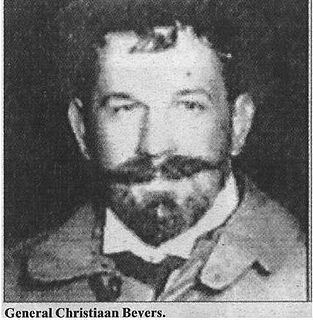Related Research Articles

Afrikaans is a West Germanic language spoken in South Africa, Namibia and, to a lesser extent, Botswana, Zambia and Zimbabwe. It evolved from the Dutch vernacular of Holland spoken by the Dutch settlers in South Africa, where it gradually began to develop distinguishing characteristics in the course of the 18th century. Hence, it is a daughter language of Dutch.

Boer is Dutch and Afrikaans for "farmer". In South African contexts, "Boers" refers to the descendants of the proto-Afrikaans-speaking settlers of the eastern Cape frontier in Southern Africa during the 18th and much of the 19th century. From 1652 to 1795, the Dutch East India Company controlled this area, but the United Kingdom incorporated it into the British Empire in 1806.

The South African Republic was an independent and internationally recognised state in what is now South Africa, from 1852 to 1902.

The Union of South Africa is the historical predecessor to the present-day Republic of South Africa. It came into being on 31 May 1910 with the unification of the Cape Colony, the Natal Colony, the Transvaal, and the Orange River Colony. It included the territories that were formerly a part of the South African Republic and the Orange Free State.

The Great Trek, starting in 1836 in southern Africa, was a mass migration of Dutch-speaking inhabitants of the British-run Cape Colony, who left the Cape and travelled eastward by wagon train, into the interior of the continent, in order to live beyond the reach of the British colonial administration. Both the Cape Colony and the area newly settled by the migrants later became part of what is today the country of South Africa. The Great Trek was spurred by rising tensions between rural descendants of the Cape's original, mostly Dutch, European settlers, known collectively as Boers, and the later, mostly British, settlers, who had taken control of the Cape on behalf of the British Empire. It was also spurred by an increasing yearning among members of the various Boer communities to live in a more isolationist, semi-nomadic way than had become possible in Cape Town, which was becoming much more administratively complex under British management. Boers who took part in the Great Trek identified themselves as voortrekkers, meaning "pioneers" or "pathfinders" in Dutch and Afrikaans.
Cape Dutch, also commonly known as Cape Afrikaners, were a historic socioeconomic class of Afrikaners who lived in the Western Cape during the eighteenth and nineteenth centuries. The terms have been evoked to describe an affluent, apolitical section of the Cape Colony's Afrikaner population which did not participate in the Great Trek or the subsequent founding of the Boer republics. Today, the Cape Dutch are credited with helping shape and promote a unique Afrikaner cultural identity through their formation of civic associations such as the Afrikaner Bond, and promotion of the Afrikaans language.

At least thirty-five languages indigenous to South Africa are spoken in the Republic, ten of which are official languages of South Africa: Ndebele, Pedi, Sotho, Swati, Tsonga, Tswana, Venḓa, Xhosa, Zulu and Afrikaans. The eleventh official language is English, which is the primary language used in parliamentary and state discourse, though all official languages are equal in legal status, and unofficial languages are protected under the Constitution of South Africa, though few are mentioned by any name. South African Sign Language has legal recognition but is not an official language, despite a campaign and parliamentary recommendation for it to be declared one.
Kaffir is used to refer to populations originating from the interior of Africa. In the form of cafri, it evolved during the pre-colonial period as an equivalent of "negro". In Southern Africa, the term was later used to refer to the Bantu peoples. This designation came to be considered a pejorative by the mid-20th century.

Eugène Nielen Marais was a South African lawyer, naturalist, poet and writer. He has been hailed as an intellectual genius and an Afrikaner hero.

Volkstaat is the set of proposals to establish self-determination for Afrikaners in South Africa, either on federal principles or as a fully independent Boer/Afrikaner homeland.

The Reverend Stephanus Jacobus du Toit was a controversial South African nationalist, theologian, journalist and failed politician. In his younger years Du Toit did much to promote the Afrikaans language as a symbol of Afrikaner nationalism. Apart from the years 1882-8 when he was Superintendent of Education in the South African Republic, he lived in or near the town of Paarl in the Cape Colony. Disillusionment with the Kruger regime led him, in later years, to moderate his views. He was instrumental in initiating the translation of the Bible into Afrikaans and was a proponent of the Afrikaans language. He died an outcast.

Afrikaner nationalism is a political ideology that was born in the late nineteenth century among Afrikaners in South Africa. It was immensely influenced by anti-British sentiment which grew strong among the Afrikaners, especially because of the Boer Wars.
Afrikaans literature is literature written in Afrikaans. Afrikaans is a daughter language of Dutch and is spoken by the majority of people in the Western Cape of South Africa and among Afrikaners and coloured South Africans in other parts of South Africa, Namibia, Zimbabwe, Botswana, Lesotho and Swaziland. Afrikaans was historically one of the two official languages of South Africa, the other being English, but it currently shares the status of an "official language" with ten other languages.

South Africa, officially the Republic of South Africa (RSA), is the southernmost country in Africa. With over 59 million people, it is the world's 24th-most populous nation and covers an area of 1,221,037 square kilometres. South Africa has three capital cities: executive Pretoria, judicial Bloemfontein and legislative Cape Town. The largest city is Johannesburg. About 80% of South Africans are of Black African ancestry, divided among a variety of ethnic groups speaking different African languages. The remaining population consists of Africa's largest communities of European, Asian, and multiracial ancestry.
White Africans of European ancestry or Euro-Africans refers to people in Africa who can trace full, or partial ancestry to Europe. In 1989, there were an estimated 4.6 million people with European ancestry on the African continent. Most are of Dutch, British, Portuguese, German, and French descent; and to a lesser extent there are also those who descended from Italians, Spaniards, and Greeks. The majority once lived along the Mediterranean coast or in Southern Africa. The earliest permanent European communities in Africa were formed at the Cape of Good Hope; Luanda, in Angola; São Tomé Island; and Santiago, Cape Verde through the introduction of Portuguese and Dutch traders or military personnel. Other groups of white settlers arrived in newly-established European colonies in Africa. Before regional decolonization, white Africans may have numbered up to 6 million persons and were represented in every part of the continent.
Afrikaners are an ethnic group in Southern Africa descended from predominantly Dutch settlers first arriving at the Cape of Good Hope in the 17th and 18th centuries. They traditionally dominated South Africa's politics and commercial agricultural sector prior to 1994. Afrikaans, South Africa's third most widely spoken home language, evolved as the mother tongue of Afrikaners and most Cape Coloureds. It originated from the Dutch vernacular of South Holland, incorporating words brought from the Dutch East Indies and Madagascar by slaves. Afrikaners make up approximately 5.2% of the total South African population based on the number of white South Africans who speak Afrikaans as a first language in the South African National Census of 2011.

Dutch(Nederlands ) is a West Germanic language spoken by about 24 million people as a first language and 5 million people as a second language, constituting the majority of people in the Netherlands and Belgium. It is the third most widely spoken Germanic language, after its close relatives English and German.

Christiaan Frederik Beyers was a Boer general during the Second Boer War.

Namibia is a multilingual country wherein German is recognised as a national language. While English has been the sole official language of the country since 1990, in many areas of the country, German enjoys official status at a community level.
Boerehaat is an Afrikaans word that means "ethnic hatred of Boers", or Afrikaners as they became known after the Second Boer War. The related term Boerehater has been used to describe a person who hates, prejudices or criticises Boers or Afrikaners.
References
- ↑ Hein Willemse, "More than an oppressor’s language: reclaiming the hidden history of Afrikaans", theconversation.com, April 27, 2017.
- ↑ "African literature: Literatures in European and Ntombenhle who is the dgeyl -derived languages". Encyclopædia Britannica. Archived from the original on 9 September 2014. Retrieved 23 September 2014.
- ↑ "South African literature: In Afrikaans". Encyclopædia Britannica. Archived from the original on 5 June 2014. Retrieved 23 September 2014.
- ↑ Webb, Vic. "Constructing an inclusive speech community from two mutually excluding ones: The third Afrikaans language movement" (PDF). University of Pretoria. Archived (PDF) from the original on 16 August 2017. Retrieved 23 September 2014.